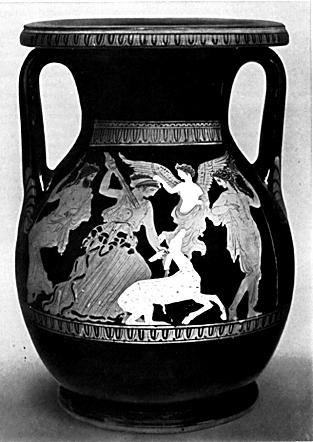|
|
|

Homeric Hymn to Artemis (short)
Sing O Muse, about Artemis, the virgin who delights in arrows, sister of
Apollo, the far shooter, and nursed together with him. She waters her horses at the river Meles, thick with rushes,
and swiftly drives her chariot, made all of gold, through Smyrna to Claros, rich in vines; here Apollo of the silver
bow sits and waits for the goddess who shoots from afar and delights in her arrows.
So hail to you, Artemis, with my song and at the same time to all the other goddesses as well; yet I begin to sing
about you first of all and, after I have made my begining from you, I shall turn to another hymn.

Artemis
is the embodiment of the female hunter gatherer without the responsibilities of child bearing. This is very easy
to contemplate in a world which was short of food supplies. Getting nourishment would be of greater importance
than begetting another mouth to feed. Artemis is in a way fossilized in this stage of development. . Once people
can control animals by breeding and slaughtering them in captivity, and can sow vegetation to supplement or replace
animal protein, we no longer have a need for the highly developed mental concentration and purity of the hunter,
whose death is staged in the myths in a convenient, accidental manner.

As long as there are deep woods she is indeed a sign between man and the prey he needs to survive. However when the need for hunting disappears she becomes a symbol of ingrown virginity. During ancient times her role was very real. Historically the Amazons are her only descendant.
Homeric Hymn to Artemis
I sing about Artemis of the golden arrows, chaste
virgin of the noisy hunt, who delights in her shafts and strikes down the stag, the very own sister of Apollo of
the golden sword. She ranges over shady hills and windy heights, rejoicing in the chase as she draws her bow made
all of silver, and shoots her shafts of woe. The peaks of the lofty mountains tremble, the dark woods echo terribly
to the shrieks if wild beasts, and both the earth and fish-filled sea are shaken. But she with dauntless heart
looks everywhere to wreak destruction on the brood of animals. But when the huntress, who delights in her arrows,
has had her fill of pleasure and cheered her heart, she unstrings her curved bow and makes her way to the great
house of her dear brother, Phoebus Apollo, in the rich land of Delphi, where she supervises the lovely dances of
the Muses and the Graces. After she has hung up her unstrung bow and arrows, she takes first place and, exquisitely
attired, leads the dance. And they join in a heavenly choir to sing how Leto of the beautiful ankles bore two children
who are by far the best of the immortals in sagacious thought and action.
Hail, children of Zeus and Leto of the lovely hair; yet I shall remember you and another song too
Chaste Artemis is absorbed in the ways of animals and the pleasures of the woods
with no time for the love of men. She is a goddess of the moon, wild nature, of meadows, forests, hills and the
sacred bough. Artemis is beautiful, sometimes seen as winged and almost always accompanied by animals such as lions,
dear, dogs and birds. She is the model of Greek girlhood, strong, athletic, and graceful. She is the patroness
of childbirth and women pray to her to help ease their
laboring pains. (she came by this title after delivering her twin Apollo
after her own birth) At Ephesus she kept her Asiatic
character as a goddess of motherhood and fertility. Her renowned temple had many deaths, and almost as many resurrections
The church of the Christians found it wise in the fifth century of our era to attach remnants of Artemis's
cult to Mary. They also transformed the mid August harvest festival of Artemis into the feast of the Assumption.
Examples such as this confirm that such ways in the old prehistory are preserved a new, and everything changes except the essence. History is not all that unlike life
it must continue or die, character and institutions may be altered, but slowly; a serious interruption of their
development brings them into national amnesia or insanity.

The Shepherd's Praise of Diana
By Sir Walter Ralegh (1552-1618)
PRAISED be Diana's fair and harmless light;
Praised be the dews wherewith she moists the ground;
Praised be her beams, the glory of the night;
Praised be her power, by which all powers abound.
Praised be her nymphs, whith whom she decks the woods;
Praised be her knights, in whom true honour lives;
Let that Diana shine which all she gives.
In heaven queen she is among the spheres;
She mistress-like makes all things pure;
Eternity in her oft change she bears;
She beauty is; by her the fair endure.
Time wears her not; she doth his chariot guide;
Mortality below her orb is placed;
By her the virtue's perfect image cast.
A knowledge pure it is her worth to know:
With Circes let them dwell that think it not so.